| Srl | Item |
| 1 |
ID:
080441
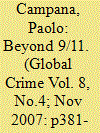

|
|
|
|
|
| Publication |
2007.
|
| Summary/Abstract |
By drawing upon the first results of an analysis carried out on the 1998-2005 period, this work tries to reconstruct the trends in terrorist attacks and their media coverage in seven international daily newspapers. Also the dynamics of media over/under-representation are investigated, as well as the existence of differentiated coverage related to the geopolitical distance/proximity of the country object of attack. Special attention is paid to an empirical analysis of the Iraqi case. The work opens with a short methodological discussion on the issue of terrorism measurement, from its operational definition to the choice of the database on which to carry out the analyses.
|
|
|
|
|
|
|
|
|
|
|
|
|
|
|
|
| 2 |
ID:
191525
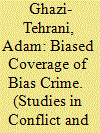

|
|
|
|
|
| Summary/Abstract |
News media differentially cover violence based on social identity. How does media bias apply to terrorist attacks—typically “upward crimes” where perpetrators hold less power than targets—that are also hate crimes—typically “downward crimes”? We compare coverage of incidents that are both terrorist attacks and hate crimes to coverage of incidents that are just terrorism in the U.S. from 2006 to 2015. Attacks that are also hate crimes receive less media attention. Articles are more likely to reference hate crimes when the perpetrator is unknown and more likely to reference terrorism when the perpetrator is non-white in some models.
|
|
|
|
|
|
|
|
|
|
|
|
|
|
|
|
| 3 |
ID:
074400
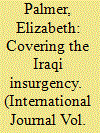

|
|
|
| 4 |
ID:
157075
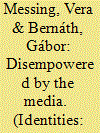

|
|
|
|
|
| Summary/Abstract |
Roma communities have experienced widespread historical exclusion in most European countries. The media can be a powerful instrument of a group’s inclusion into the mental map of a society, or, on the contrary, it can contribute to the group’s exclusion and disempowerment. This article builds on a series of content and discursive analyses of the news media’s coverage of Hungarian Roma communities since 1993, interviews with stakeholders and focus group discussions in Roma communities. It scrutinises media reporting about Roma and argues that, in general, the scope and the agenda of Roma’s portrayal coincide with mainstream society’s stereotypes about the group. The article will additionally look at the media’s disempowering role from two perspectives: on the one hand, the extent to which Roma have access to influencing media content, and on the other hand, it will consider the role of minority communities in challenging stereotypical images.
|
|
|
|
|
|
|
|
|
|
|
|
|
|
|
|
| 5 |
ID:
123171
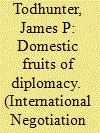

|
|
|
|
|
| Publication |
2013.
|
| Summary/Abstract |
Abstract The notion that national leaders use foreign policy actions for domestic political benefit is widely accepted in the foreign policy literature, but has only been studied with regard to foreign policy involving the use of force. Literature on third-party mediation has emerged separately and has not taken mediators' domestic political motivations and constraints into account when explaining mediation occurrence and outcomes. Diplomatic efforts such as mediation should be appealing to leaders seeking to impress their domestic audience because it provides them with a low risk opportunity to appear competent to their domestic audience. While mediation is a regular occurrence in US foreign policy, its public visibility varies greatly. However, models of presidential media coverage suggest that media outlets are likely to pay a disproportionate amount of attention to presidents and their high level surrogates while engaging in diplomacy overseas. The article proposes that the higher the profile of the official an administration sends to mediate a crisis overseas, the greater the increase in the president's approval rating. Additionally, the public's attentiveness to foreign policy should condition the effect of a high profile mediator on presidential approval. As foreign policy becomes more salient to the public, the effect of a higher profile mediator on presidential approval should be greater. Empirical results support the argument.
|
|
|
|
|
|
|
|
|
|
|
|
|
|
|
|
| 6 |
ID:
144921
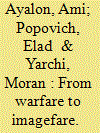

|
|
|
|
|
| Summary/Abstract |
Conflicts in the 21st century differ from past conflicts based on two central factors: the level of asymmetry and disparity between the actors taking part in the conflict and the amount of foreign media coverage that a conflict receives. This article aims to develop a new theoretical perspective on the implications of these two factors on how the involved states manage a conflict. Most actors in current conflicts have vast levels of disparity and receive extensive media coverage; events in those conflicts are referred to as occurrences in the “information space” because a conflict's borders are anywhere people can receive information about it. “Imagefare”—the use of images as a guiding principle or a substitute for traditional military means to achieve political objectives—is argued to be the main tool for better facing adversaries in the information space.
|
|
|
|
|
|
|
|
|
|
|
|
|
|
|
|
| 7 |
ID:
171835
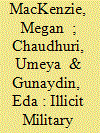

|
|
|
|
|
| Summary/Abstract |
How can we understand consistent public support and trust of the military even in climates of high rates of public awareness about military sexual violence? This article examines how the phenomenon of military sexual violence is mediated to the public through a media content and discourse analysis of newspaper reportage about military sexual violence in Australia. The analysis covers an almost thirty-year period (1989–2016) during which several “sex scandals,” some of international import, broke out. We analyze several frames used to depict the issue and conclude that military sex scandals, like other illicit military behaviors, tend to be publicly framed either as (1) a rarity that is atypical of the institution (“bad apples”) or (2) inevitable and so typical of the institution as to be unremarkable. The article then seeks to demonstrate that these seemingly disparate frames are not contradictory, but rather unify into a singular narrative. The narrative cohering these disparate frames is that military sexual violence is a phenomenon that cannot be prevented or addressed and is therefore unproblematic for the institution.
|
|
|
|
|
|
|
|
|
|
|
|
|
|
|
|
| 8 |
ID:
093167
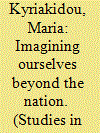

|
|
|
| 9 |
ID:
073802
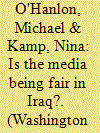

|
|
|
|
|
| Publication |
2006.
|
| Summary/Abstract |
Using original data to systematically assess individual outlets and the media overall, the authors conclude that broad criticism of the U.S. media is often badly overstated.
|
|
|
|
|
|
|
|
|
|
|
|
|
|
|
|
| 10 |
ID:
165856
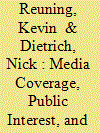

|
|
|
|
|
| Summary/Abstract |
Donald Trump’s success in the 2016 presidential primary election prompted scrutiny for the role of news media in elections. Was Trump successful because news media publicized his campaign and crowded out coverage of other candidates? We examine the dynamic relationships between media coverage, public interest, and support for candidates in the time preceding the 2016 Republican presidential primary to determine (1) whether media coverage drives support for candidates at the polls and (2) whether this relationship was different for Trump than for other candidates. We find for all candidates that the quantity of media coverage had significant and long-lasting effects on public interest in that candidate. Most candidates do not perform better in the polls following increases in media coverage. Trump is an exception to this finding, receiving a modest polling bump following an increase in media coverage. These findings suggest that viability cues from news media contributed to Trump’s success and can be influential in setting the stage in primary elections.
|
|
|
|
|
|
|
|
|
|
|
|
|
|
|
|
| 11 |
ID:
073111
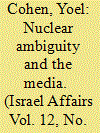

|
|
|
| 12 |
ID:
140764
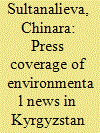

|
|
|
|
|
| Summary/Abstract |
This article explores obstacles and conditions that environmental nongovernmental organizations face in interacting with media outlets in Kyrgyzstan. It also examines the limited scope of environmental journalism and the resulting limited ability of news outlets and eco-NGOs to help set the public agenda for discussion of policy and issues in the country. Even if such public relations interaction occurs, it is rarely effective and rarely generates influential eco/environmental articles in the media. The study is based on a content analysis of the news agency 24.kg and the newspaper Vecherniy Bishkek. It includes results of a survey and interviews with eco-NGOs representatives.
|
|
|
|
|
|
|
|
|
|
|
|
|
|
|
|
| 13 |
ID:
171149
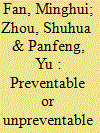

|
|
|
|
|
| Summary/Abstract |
China’s polluted air has seriously affected the health of the Chinese population. This paper uses attribution theory to investigate how Chinese newspapers and non-Chinese newspapers presented smog in China and attributed causes and responsibilities. Built on previous studies, this study adopted covariation model within attribution theory and painted an interesting picture of smog coverage by Chinese and non-Chinese newspapers because of the apparent differences in perspectives. The criteria further provided folder for elaboration on explaining why the different coverages attributed causes as they did. Implications are discussed.
|
|
|
|
|
|
|
|
|
|
|
|
|
|
|
|
| 14 |
ID:
072140
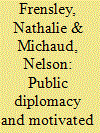

|
|
|
|
|
| Publication |
2006.
|
| Summary/Abstract |
Successful U.S. public diplomacy requires consonance between the actual message and what the audience comprehends. Contending consonance strategies involve initially formulating foreign policy goals and strategies to resonate with audience values or later changing audience values to support formulated goals. At what foreign-policy-making stage will public diplomacy involvement best facilitate message reception? Recognizing overseas presses as mediators in message reception, we analyze whether foreign affairs reporters are Bayesian or motivated reasoning information processors of U.S. foreign policy statements. Our findings support public diplomacy involvement in the policy formulation stage by showing the most frequently recounted sentences from United States president George W. Bush's post-September 11th speeches invoked frames resonating with Canadian national foreign policy values even when controlling for the effects of journalistic practices.
|
|
|
|
|
|
|
|
|
|
|
|
|
|
|
|
| 15 |
ID:
142095
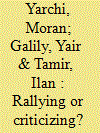

|
|
|
|
|
| Summary/Abstract |
The reaction of authorities to terror attacks or threats has the potential to attract both support and criticism. The current study aims to examine the international media's discourse surrounding authorities' reaction to sporting events that have suffered from terror attacks or terror threats. A comparison is made between events that are canceled and events that take place as planned despite the attack or threat. Our findings indicate no significant differences between the coverage of events that are canceled and those that continue as planned. The evidence actually exhibits greater levels of support rather than criticism of authorities in international media coverage.
|
|
|
|
|
|
|
|
|
|
|
|
|
|
|
|
| 16 |
ID:
158831
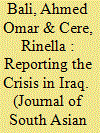

|
|
|
| 17 |
ID:
117643
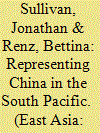

|
|
|
|
|
| Publication |
2012.
|
| Summary/Abstract |
Chinese diplomacy, aid, economic interactions and manifestations of soft
power have increased the country's influence in the South Pacific region. By some
accounts, China's influence is already approaching that of traditional stakeholders
Australia and New Zealand. In Africa and other regions state-led and private activities
in established powers' perceived spheres of influence has caused concern and
inspired particular narratives about China's motivations. In this article we examine
how media discourses in Australia and New Zealand have represented China's role in
the South Pacific. We find that China's role has been constructed using multiple
negative frames, which seek to establish China as unequivocally 'different'. More
than being unencumbered by the constraints of public opinion and a free press, China
is portrayed as operating in a different moral universe, in which the cold hearted
exploitation of vulnerable island nations (often in cahoots with venal island elites) is
entirely normal. The article shows how such constructions reveal some of the
complex issues involved in Australia and New Zealand's relationships both with
China and other South Pacific nations.
|
|
|
|
|
|
|
|
|
|
|
|
|
|
|
|
| 18 |
ID:
172512
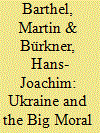

|
|
|
|
|
| Summary/Abstract |
Geopolitical shifts and the changing significance of borders in the EU’s neighbourhood are usually understood as a matter of international power politics. Factors that accompany geopolitical impact on borders, such as media coverage of geopolitical change, often appear as secondary or irrelevant. However the recent Ukraine conflict revealed the contrary as pro-EU attitudes were strongly supported by ‘western’ media. Therefore this paper seeks to clarify the role of news media in creating perspectives and attitudes on geopolitical shifts and the significance of European borders. Empirical evidence on the coverage of the evolving Ukraine crisis by German news sources portrays the media as promoters of biased framings and imaginaries which suggest that the EU be a potential conflict party in the newly evolving geostrategic confrontation in its eastern neighbourhood. The findings indicate that during critical periods of the Ukraine crisis media reports combined rising euphoria about Europe and ‘the West’, as defenders of the ‘good cause’, with excessive moral polarising and the discursive normalisation of a rhetoric of escalation. Imaginaries of a bipolar world (The West against Russia) and a new Cold War prepared the ground for a new understanding of European borders and neighbourhood relations as being manipulable at will.
|
|
|
|
|
|
|
|
|
|
|
|
|
|
|
|
| 19 |
ID:
073769
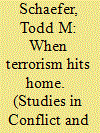

|
|
|
|
|
| Publication |
2006.
|
| Summary/Abstract |
Analyzing newspaper coverage of the 1998 Nairobi and 2002 Mombasa terrorist attacks by the Nairobi Daily Nation and East African Standard finds that generalizations from Western sources, such as newsworthiness criteria and coverage of government officials and terrorists, appear similar in Kenyan media, although interpretation of the attacks were colored by a "developing world" perspective in some respects. Terrorists also ironically are more prominent in subsequent attacks, although perhaps only when they fail to inflict heavy damage and casualties. The second attack also brought far more criticism on the Kenyan government, which may have implications for similar events in other countries.
|
|
|
|
|
|
|
|
|
|
|
|
|
|
|
|